HOW CAN WE HELP YOU? Call 1-800-TRY-CHOP
In This Section
Center for Autism Research Reaches a Decade of Scientific Insights, Leadership
 The Center for Autism Research at Children’s Hospital of Philadelphia is celebrating a decade of conducting autism research to understand the causes of autism spectrum disorder, develop effective therapies, and train the next generation of master clinicians and scientists in state-of-the-science best practices for autism screening, diagnosis, and treatment.
The Center for Autism Research at Children’s Hospital of Philadelphia is celebrating a decade of conducting autism research to understand the causes of autism spectrum disorder, develop effective therapies, and train the next generation of master clinicians and scientists in state-of-the-science best practices for autism screening, diagnosis, and treatment.
“CHOP’s vast patient base of 10,000 patients per year with ASD combined with unparalleled clinical and research expertise in multiple specialties affords us an extremely rare opportunity to conduct research that is rigorous, reproducible, and ultimately translatable: to accelerate the pace at which we’re able to improve care and long-term outcomes for patients with ASD within the CHOP Care Network and throughout the country,” said Robert T. Schultz, PhD, CAR’s scientific director.
Look back at the numerous milestones CAR has achieved over the past 10 years. And get a glimpse of the future: CAR is building an integrated clinical/research program known as the “Autism Learning Health System” that is a testing ground for new treatments and models of care, with the support of patients and families, research collaborators, and partners like the Philadelphia Eagles. Learn more in in CAR’s 10th Anniversary Report.
Building a Solid Foundation
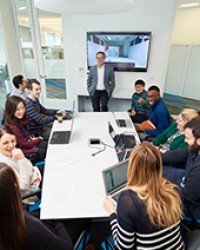 The Center for Autism Research was founded in 2008 as a joint center spanning between CHOP and the University of Pennsylvania. It grew quickly into one of the largest and most comprehensive autism research centers in the world. Scientific director Robert Schultz, PhD, a neuropsychologist pioneering autism brain imaging research, was recruited from Yale University to build the new center from the ground up with developmental pediatrician Susan E. Levy, MD, MPH, as medical director. “Dr. Schultz’s studies of the social brain were the perfect complement to the clinical research taking place at the Regional Autism Center at that time and strengthened our ability to improve early diagnosis and develop treatments for children with autism spectrum disorder,” Dr. Levy said.
The Center for Autism Research was founded in 2008 as a joint center spanning between CHOP and the University of Pennsylvania. It grew quickly into one of the largest and most comprehensive autism research centers in the world. Scientific director Robert Schultz, PhD, a neuropsychologist pioneering autism brain imaging research, was recruited from Yale University to build the new center from the ground up with developmental pediatrician Susan E. Levy, MD, MPH, as medical director. “Dr. Schultz’s studies of the social brain were the perfect complement to the clinical research taking place at the Regional Autism Center at that time and strengthened our ability to improve early diagnosis and develop treatments for children with autism spectrum disorder,” Dr. Levy said.
In addition to advancing the science and improving clinical care for patients with ASD, it’s a central part of CAR’s mission to support families currently navigating an autism diagnosis. CAR’s outreach team hosts regular talks and workshops, and the CAR Autism Roadmap ™ is a 24/7 reference and resource directory for parents and clinicians.
Infant Brain Imaging Study Begins
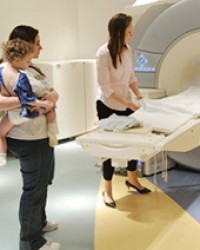 Within the first year, under Dr. Schultz’ leadership, CAR initiated the Infant Brain Imaging Study (IBIS) funded by the Autism Centers of Excellence grant program of the National Institute of Mental Health. The long-term study focuses on infants with an older sibling already diagnosed with ASD, since these infants are at a higher risk for developing autism by age 2. Researchers use magnetic resonance imaging (MRI) to look for changes in the brains of infants who go on to develop ASD, compared with those who do not receive a diagnosis. The IBIS study, which is still active today, has produced several groundbreaking research findings, including a recent study which applied machine learning techniques to brain imaging data, to identify with more than 96 percent accuracy which children would go on to be diagnosed with autism by 2 years of age, and which children would not. “This is an astounding observation that could fundamentally change clinical practice,” said Dr. Schultz, who leads the CHOP research site along with Juhi Pandey, PhD.
Within the first year, under Dr. Schultz’ leadership, CAR initiated the Infant Brain Imaging Study (IBIS) funded by the Autism Centers of Excellence grant program of the National Institute of Mental Health. The long-term study focuses on infants with an older sibling already diagnosed with ASD, since these infants are at a higher risk for developing autism by age 2. Researchers use magnetic resonance imaging (MRI) to look for changes in the brains of infants who go on to develop ASD, compared with those who do not receive a diagnosis. The IBIS study, which is still active today, has produced several groundbreaking research findings, including a recent study which applied machine learning techniques to brain imaging data, to identify with more than 96 percent accuracy which children would go on to be diagnosed with autism by 2 years of age, and which children would not. “This is an astounding observation that could fundamentally change clinical practice,” said Dr. Schultz, who leads the CHOP research site along with Juhi Pandey, PhD.
Enhancing Autism Support in Schools
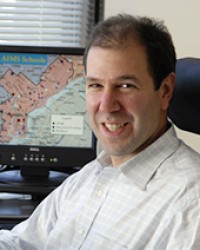 Most children with autism receive the majority of their care in school. In 2008, CAR’s Associate Director, David Mandell, ScD, who also directs Penn’s Center for Mental Health Policy & Services Research, initiated Philly AIMS, the largest-ever randomized trial of an educational intervention for children with autism, and the first to be conducted as a partnership between an academic research center and a school district. Although the study ended several years ago, the Philly AIMS team continues to provide integrated support via professional development training and classroom-based consultation to Philadelphia School District teachers in grades K‐5 autism support classrooms.
Most children with autism receive the majority of their care in school. In 2008, CAR’s Associate Director, David Mandell, ScD, who also directs Penn’s Center for Mental Health Policy & Services Research, initiated Philly AIMS, the largest-ever randomized trial of an educational intervention for children with autism, and the first to be conducted as a partnership between an academic research center and a school district. Although the study ended several years ago, the Philly AIMS team continues to provide integrated support via professional development training and classroom-based consultation to Philadelphia School District teachers in grades K‐5 autism support classrooms.
Dr. Mandell’s team also is conducting research in Philadelphia preschools to analyze the type and quality of intervention being delivered in inclusive versus non-inclusive settings. His goal is to parse out which settings are best for which children. “By comparing outcomes of different early intervention practices and investigating intervention-child fit in community-based settings, we hope to make complex early intervention placement decisions easier for both parents and providers,” Dr. Mandell said.
Genetic Discoveries Key to Unravelling Autism
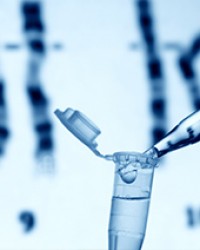 In collaboration with Hakon Hakonarson, MD, PhD, and the Center for Applied Genomics (CAG), CAR has led some of the most important genetic discoveries related to autism, including the 2009 discovery of the first common genetic variants of ASD, accounting for up to 15 percent of all ASD cases. CAG-CAR research also has informed the study of genetically targeted drugs that could improve social communication difficulties, a core symptom of ASD.
In collaboration with Hakon Hakonarson, MD, PhD, and the Center for Applied Genomics (CAG), CAR has led some of the most important genetic discoveries related to autism, including the 2009 discovery of the first common genetic variants of ASD, accounting for up to 15 percent of all ASD cases. CAG-CAR research also has informed the study of genetically targeted drugs that could improve social communication difficulties, a core symptom of ASD.
Approximately 75 genes are known to significantly increase the risk of autism, and there are likely hundreds more. Capitalizing on the technology and infrastructure established by the Roberts Collaborative for Genetics and Individualized Medicine and as a research site in the Simons SPARK study, CHOP is poised to unravel the complicated genetics of autism that have kept its origins a mystery for decades.
CAR continues to accelerate research along with the Department of Biomedical and Health Informatics and the Division of Developmental and Behavioral Pediatrics by establishing a biorepository that integrates genetic data with available corresponding medical, developmental, and behavioral information from consenting patients.
New Research Approach: Digital Phenotyping
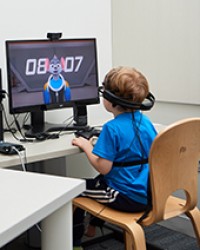 CAR’s pioneering research has increased understanding of the social behaviors associated with autism that may interfere with daily life. Dr. Schultz and his team were the first to show that video games can help improve the ability of individuals with autism to understand others’ facial expressions. Two studies under way use therapeutic video games to help children with ASD develop their social skills and ability to concentrate. A third study partners with the Philadelphia Police Department and uses virtual reality to help young people with ASD acclimate to appropriate and safe interactions with law enforcement.
CAR’s pioneering research has increased understanding of the social behaviors associated with autism that may interfere with daily life. Dr. Schultz and his team were the first to show that video games can help improve the ability of individuals with autism to understand others’ facial expressions. Two studies under way use therapeutic video games to help children with ASD develop their social skills and ability to concentrate. A third study partners with the Philadelphia Police Department and uses virtual reality to help young people with ASD acclimate to appropriate and safe interactions with law enforcement.
CAR’s international leadership in “digital phenotyping” is ushering in a new era for autism research. All behaviors that an expert clinician can observe may now be captured with sophisticated technology and used in artificial intelligence analytic frameworks to produce precise, research grade information that is predictive of evaluations requiring more than 10 times the amount of time and resources. In pilot studies, this technology predicted with greater than 90 percent accuracy — after a three-minute conversation — if a person has ASD.
Using Research to Inform Clinical Care
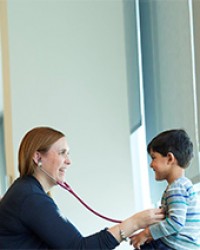 CHOP is working on an ambitious project to create an Autism Spectrum Disorder Learning Healthcare System (LHS) in which scientific evidence informs clinical practice, and clinical practice promotes scientific investigation by generating new data for analysis. CHOP provides care for more than 10,000 patients with ASD, which allows LHS experts to discern patterns in symptoms, behavior, genetics, and developmental factors. They can use this knowledge to tailor a patient’s clinical support programs.
CHOP is working on an ambitious project to create an Autism Spectrum Disorder Learning Healthcare System (LHS) in which scientific evidence informs clinical practice, and clinical practice promotes scientific investigation by generating new data for analysis. CHOP provides care for more than 10,000 patients with ASD, which allows LHS experts to discern patterns in symptoms, behavior, genetics, and developmental factors. They can use this knowledge to tailor a patient’s clinical support programs.
“An LHS effectively turns the clinic into a research lab, where discovery is a natural outgrowth of patient care,” Dr. Schultz said.
Developmental pediatrician Amanda Bennett, MD, MPH, who is part of the team building the LHS infrastructure, finds the new approach incredibly exciting: “Unlike a research study or clinical trial in which some children receive the investigational therapy and others do not, with the LHS we give each child the individualized care they need now. Then, we track and analyze their reactions to that treatment — adjusting as needed — and use that information to inform future care for children with autism."